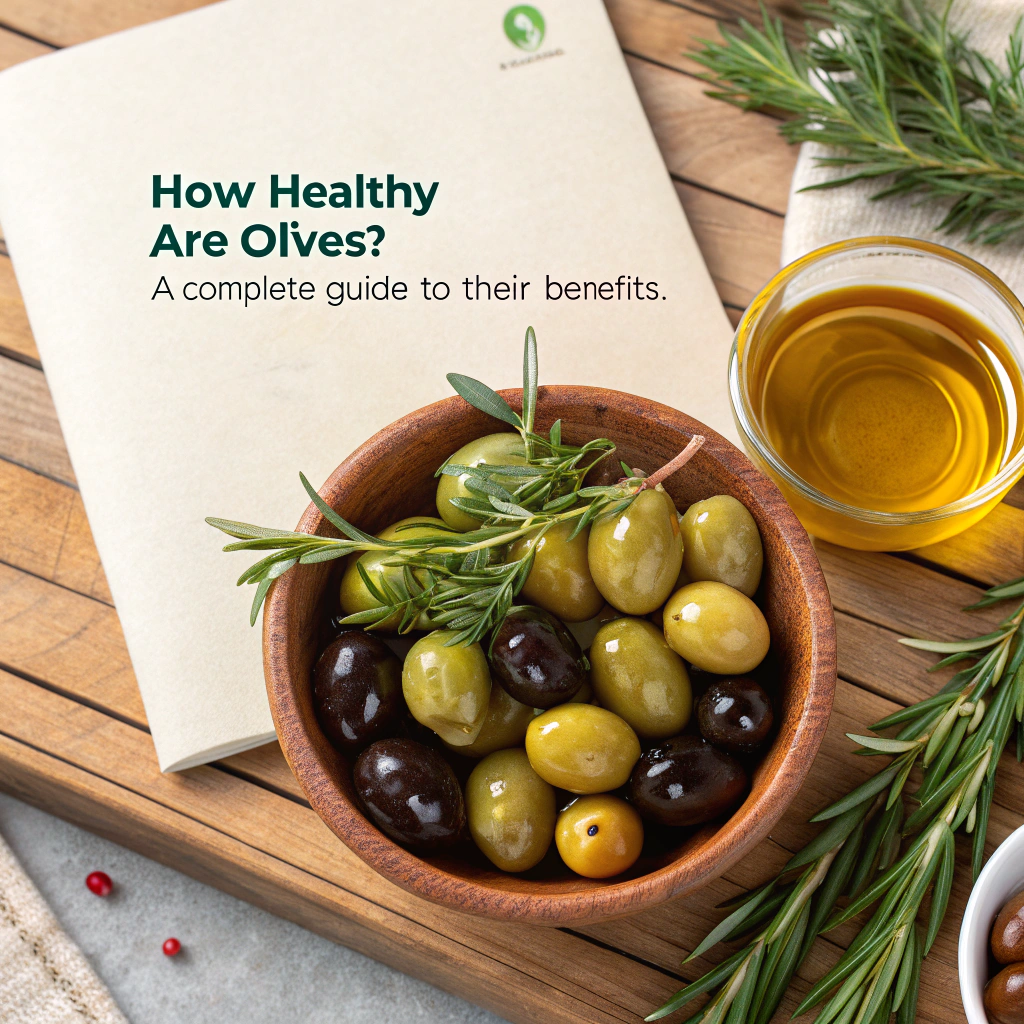Health benefits of olives : How Healthy Are Olives? A Complete Guide to Their Benefits
Ever grabbed a handful of olives as a quick snack and wondered if they’re really good for you? These small, briny fruits have been a staple in Mediterranean diets for millennia—and for good reason. Whether you love them stuffed with garlic or plain on a charcuterie board, olives pack a surprising punch of nutrients. They can boost your heart, gut, and overall wellness.
With trends pointing to fermented foods like olives as key players in modern healthy eating, it’s time to explore why these tiny gems deserve a spot on your plate every day.
Table of Contents
The Mediterranean Superfood: An Introduction to Olives
Olives have been a staple for thousands of years. They come from the Mediterranean, where they were first grown in ancient Crete around 3000 BC. Today, they are grown all over the world, with Spain, Italy, Greece, and California leading the way. Their journey from ancient times to today shows their lasting importance in health and tradition.

A Brief History of Olives in Human Diet
Wild olives (Olea europaea) were first tamed over 6,000 years ago. The ancient Greeks and Romans saw them as symbols of peace and wealth. By the Middle Ages, they were grown across Europe and North Africa. Now, thanks to modern farming, olives are enjoyed in kitchens around the world, with California playing a big role in the U.S.
Why Olives Are Considered a Superfood
Olives are called superfoods because they are so full of good stuff. Here’s why:
- Antioxidant powerhouses: They’re packed with polyphenols and vitamin E, fighting off oxidative stress.
- Heart-healthy fats: Most of their calories are from monounsaturated fats, which help lower LDL cholesterol.
- Mineral boost: They’re full of iron, calcium, and copper, which help with immunity and bone health.
Studies show that eating olives every day can help reduce inflammation and improve digestion.
Olives in Modern American Diets
As more people learn about the Mediterranean diet, olives are becoming popular in the U.S. They’re used in salads, on pizzas, and as snacks. California producers are making special olives, mixing old traditions with new flavors. Olives add taste and fit with the trend of eating whole foods.

Nutritional Profile: What Makes Olives Special
Olives are packed with nutrients that boost your health. They contain heart-healthy fats and vitamins like vitamin E in olives. This makes them more than just a snack.
They also have minerals like iron and calcium. Plus, they have fiber to keep you full without adding too many calories.
| Nutrient | Black Olives (100g) | Green Olives (100g) |
|---|---|---|
| Calories | 116 | 145 |
| Total Fat | 10.9g (9.3g unsaturated) | 15.3g (13.3g unsaturated) |
| Fiber | 1.6g | 3.3g |
| Vitamin E | 1.65mg (11% RDA) | 3.81mg (25% RDA) |
| Iron | 6.28mg | 0.49mg |
| Sodium | 735mg (49% RDA) | 1,556mg (65% RDA) |
Green olives have twice as much vitamin E as black ones. This boosts your body’s defenses against free radicals. Their fiber helps with digestion.
Black olives, on the other hand, have more iron. This helps your body make energy. Both types of olives have unsaturated fats that are good for your heart.
But, green olives have more sodium. So, it’s best to eat only ¼ cup to keep sodium levels in check.
Choose Kosterina olives that are brined in sea salt for 6–12 months. This method keeps more nutrients, like probiotics and antioxidants, compared to lye-cured olives. Their natural fermentation process helps keep vitamins and olive health benefits in every bite.
The Health Benefits of Olives: What Science Tells Us
Research shows that health benefits of olives go beyond their delicious taste. These small fruits play a big role in keeping our bodies healthy. Studies back up how olives affect our body’s key systems.
cardiovascular protection>Heart-healthy olives are full of good fats. They help increase “good” HDL cholesterol and lower “bad” LDL oxidation. A big study found that eating Mediterranean diets with lots of olives can lower heart disease risk by 28%.
They also have polyphenols like hydroxytyrosol that stop plaque from building up. Oleic acid helps lower blood pressure too.
cancer risk reduction>Lab tests show that olives can stop tumors from growing in lung, skin, and prostate cells. Antioxidants in olives fight off free radicals that harm DNA. Oleocanthal, an anti-inflammatory, cuts down on harmful markers.
A 30-day study showed eating 12 green olives a day can lower inflammation in people.
blood sugar regulation>Olives help slow down sugar absorption, keeping blood sugar levels stable. A 2020 study found that adding olives to the diet of people with prediabetes improved insulin sensitivity. Their fiber and polyphenols help prevent sudden spikes in blood sugar.
bone health support>Olive polyphenols and calcium help keep bones strong. A 2021 trial found that postmenopausal women who ate olives every day had a 15% increase in osteocalcin—a bone formation marker. These nutrients may help reduce the risk of fractures as we age.
These studies support the Mediterranean diet’s focus on olives for a long, healthy life. Eating a small amount every day can make a big difference without needing to make big changes.
Powerful Antioxidants in Olives and How They Work
Antioxidants in olives act like tiny shields protecting your cells from daily wear and tear. These natural compounds fight harmful molecules called free radicals. Free radicals can damage cells and contribute to aging or diseases. Let’s break down how vitamin e in olives and other key antioxidants work together to support your health.
Vitamin E and Polyphenols: Nature’s Defense Team
Olives have a powerful duo: vitamin e in olives and polyphenols like hydroxytyrosol. Vitamin E directly neutralizes free radicals. Polyphenols boost your body’s own antioxidant defenses. Together, they form a barrier against oxidative stress—a root cause of conditions like heart disease and cancer.
Fighting Free Radicals in Your Body
- Antioxidants in olives stop free radicals from damaging cell membranes and DNA.
- Hydroxytyrosol, a unique polyphenol, traps free radicals 5 times more effectively than vitamin C.
- Vitamin E protects fats in cell membranes from becoming rancid, maintaining cellular integrity.
Slowing Age-Related Damage
Over time, oxidative damage accumulates, leading to wrinkles, joint stiffness, or weakened immunity. The antioxidants in olives slow this process. Polyphenols repair damaged cells, while vitamin E’s lipid protection preserves youthful skin and nerve function. Think of them as your body’s maintenance crew, keeping systems running smoothly longer.
How Olives Support Your Heart Health
Eating heart-healthy olives every day can be a simple way to improve heart health. A study in the New England Journal of Medicine showed that the Mediterranean diet, rich in olives, cuts heart disease risk by 28%. This is because of the amazing health benefits of olives.
These small fruits are big for your heart. They have monounsaturated fats, like oleic acid, that help lower bad LDL cholesterol and raise good HDL cholesterol. Just 10 green olives (about 1.5 ounces) give you 6g of these fats with only 58 calories. Here’s what you get in each serving:
| Nutrient | Amount per 10 olives |
|---|---|
| Calories | 58 |
| Fat | 6g |
| Carbohydrates | 1.5g |
| Fiber | 1.3g |
| Potassium | 150mg |
Potassium in olives helps keep blood pressure stable. Their polyphenols, like hydroxytyrosol, fight inflammation and reduce oxidative stress. Vitamin E in olives also helps prevent plaque buildup.
Adding olives to meals with nuts and avocado boosts benefits. Since 3 olives have 200mg sodium, watch your intake if you have blood pressure issues. Choose low-sodium olives when you can. These tasty additions help protect your heart without needing big diet changes.
Anti-Inflammatory Properties: Easing Chronic Inflammation
Chronic inflammation is linked to diseases like arthritis and heart disease. The anti-inflammatory properties of olives provide a natural solution. They help reduce inflammation, supporting your body’s fight against chronic conditions.
Olives vs. Common Inflammatory Conditions
Research indicates olives may help manage:
- Rheumatoid arthritis: Oleocanthal in olives acts like ibuprofen, easing joint pain.
- Inflammatory bowel diseases: Their antioxidants lower gut inflammation markers like CRP.
The Oleocanthal Factor
Oleocanthal, a unique polyphenol in olives, works like ibuprofen to block inflammatory pathways. This compound reduces pain and swelling in chronic conditions. Studies show people with rheumatoid arthritis felt less pain after eating olives.
Adding olives to a balanced diet enhances their health benefits of olives. Even small daily servings can support your health. Let these flavorful fruits be your natural ally against inflammation!
Olives for Skin, Hair, and Digestive Health
Olives are great for your skin and hair. They contain olive oil benefits like vitamin E and polyphenols. These fight sun damage and wrinkles, making skin look younger.
They also boost collagen, keeping skin hydrated. For hair, these vitamins strengthen strands and reduce breakage. This leads to healthier-looking hair.
Olives are also good for your digestion. Just 20 large black olives have 2 grams of fiber. This helps with digestion and prevents bloating.
Fermented olives, like Kalamatas, act as natural probiotics. They help keep your gut bacteria balanced. Their fiber also helps you feel full longer, which can help with weight management.
- Tip: Mash ripe olives into a DIY face mask for a moisturizing boost.
- Tip: Add olives to salads or snacks to harness their fiber and probiotics.
While olive oil’s antioxidants soothe inflamed skin, enjoy olives in moderation. They have sodium. A handful a day gives you olives for skin health benefits without too much salt. Olives nourish you from the inside out.
Black vs. Green: Different Olives, Different Benefits
Choosing between green and black olives is more than just a flavor preference. It’s about picking the olive health benefits that fit your needs. Both types have nutritional value, but their ripeness and curing processes make them unique. This uniqueness aligns with different wellness goals.
Nutritional Differences Between Olive Varieties
| Nutrient | Green Olives (per 100g) | Black Olives (per 100g) |
|---|---|---|
| Sodium | 1,556 mg | 735 mg |
| Vitamin E | 3.81 mg | 1.65 mg |
| Iron | 0.49 mg | 6.28 mg |
| Zinc | 0.04 mg | 0.22 mg |
| Potassium | 42 mg | 8 mg |
| Fiber | 3.3 g | 1.6 g |
Which Olives to Choose for Specific Health Goals
Prioritize health benefits of olives based on your needs:
- Heart health: Black olives with lower sodium and higher iron support cardiovascular wellness.
- Immune support: Green olives’ vitamin E and potassium boost immunity.
- Bone strength: Black olives’ zinc and calcium slow bone loss.
- Low-sodium diets: Black olives cut sodium intake by over 50% compared to green.
Remember, both types are rich in antioxidants. Pair black olives with meals needing iron, and green olives for vitamin E. Aim for 15–20 olives daily to balance their unique nutrients.
Incorporating Olives Into Your Daily Diet: Practical Tips
Adding olives to your meals is easy. Whether you’re looking into Mediterranean diet benefits or olive oil benefits, small changes can make a big difference. Start with 5–10 olives a day to get their fiber and healthy fats without too much sodium.
Beyond Salads: Creative Ways to Enjoy Olives
Olives are more than just a salad topping. They can add flavor to many dishes and snacks. Here are some ideas:
- Snack on olives with almonds for a protein-fiber combo.
- Mix into pasta dishes or top baked potatoes for a salty crunch.
- Blend into dips like hummus or pesto for olive oil benefits in every bite.
- Stir into soups or grain bowls for a Mediterranean twist.
Recommended Serving Sizes for Maximum Benefits
Stick to 1/4 cup (about 5–10 olives) daily to balance sodium and nutrients. Choose low-sodium brands or rinse olives before eating. Pair them with fresh veggies to boost fiber intake and support heart health.
Olive-Based Recipes for Health-Conscious Eaters
Try these easy dishes:
| Recipe | Ingredients | Health Highlights |
|---|---|---|
| Creamy Chicken & Kale Bowl | Chicken breast, baby kale, kalamata olives, olive oil, lemon | Combines Mediterranean diet benefits with protein and antioxidants. |
| Roast Veggie Flatbread | Whole-wheat flatbread, cherry tomatoes, green olives, feta | Rich in fiber and vitamin E for skin health. |
| Salmon & Olive Skewers | Salmon fillets, black olives, red onion, balsamic glaze | Omega-3s from salmon pair with olives’ anti-inflammatory compounds. |
Pair olives with whole grains or veggies to amplify mediterranean diet benefits. Adjust sodium by choosing low-salt varieties.
Potential Side Effects and Who Should Limit Olive Consumption
Olives are good for you, but don’t eat too much. They have a lot of sodium because of how they’re cured. It’s important to know this before you start eating them.
- Sodium Alert: A ½-cup serving can supply up to 50% of your daily sodium allowance. Excess salt may raise blood pressure risks for those with hypertension.
- Allergy Risks: Rare cases of reactions occur, often tied to olive tree pollen. Swelling or itching after eating may signal an allergy.
- Calorie Watch: 5 olives hold 9 calories—small portions help avoid unintentional calorie gains.
| Key Nutrient | Per 5 Olives |
|---|---|
| Sodium | 0.6g (24% of NHS 6g daily limit) |
| Monounsaturated Fat | 0.9g (heart-healthy fats) |
| Fiber | 0.3g (supports digestion) |
If you’re on a low-salt diet, pick low-sodium olives or rinse them. People with kidney or heart problems should watch their portions. If you’re allergic, olive oil might be safer than fresh olives. Always think about the health benefits of olives and your health goals. If you’re not sure, talk to a doctor.
Being careful with how much you eat lets you enjoy olives safely. Eat small amounts, check labels, and mix them with other foods for the best health.
Conclusion: Making Olives Part of Your Healthy Lifestyle
Olives are key to the Mediterranean diet, offering fats and antioxidants that boost health. They help lower bad cholesterol, fight inflammation, and protect cells. Adding olives to your meals can reduce disease risks and increase life span.
Green or black olives, both are packed with vitamins and polyphenols. These fight free radicals and strengthen bones. Extra virgin olive oil’s oleocanthal is a natural anti-inflammatory. Pairing olives with veggies or grains follows Mediterranean diet principles for balance.
Begin by adding olives to salads, dips, or as a snack. Choose unprocessed olives for more nutrients. Spain leads in olive oil production, showing its importance in healthy eating. Use EVOO for cooking to add healthy fats and flavor.
Olives are not a quick fix but a tasty step toward better eating. They help with digestion, fight aging, and support brain and heart health. Try different types like Kalamata or Cerignola for new tastes and benefits. Small changes, like choosing olives over chips, can lead to a healthier diet.
Even a few olives a day can make your diet more balanced. Their versatility makes them easy to add to meals or snacks. By doing so, you follow a diet backed by science and tradition. Your next meal is a chance to enjoy tradition and nourish your body with a small, mighty superfood.
FAQ
What are the health benefits of olives?
Olives are full of antioxidants and healthy fats. These can help your heart, reduce inflammation, and improve skin health. They also have vitamin E, which adds to their antioxidant power.
How does olive oil compare to whole olives in terms of health benefits?
Olive oil keeps many good things from whole olives, like healthy fats and antioxidants. But, whole olives also have fiber, which is good for your digestive system.
What are the key components of a Mediterranean diet that include olives?
The Mediterranean diet focuses on whole foods like fruits, veggies, whole grains, fish, and healthy fats like olive oil. Adding olives to this diet can boost heart health and overall well-being.
Are there any specific antioxidants in olives that are particularily beneficial?
Yes, olives are full of vitamin E and polyphenols. These help fight oxidative stress and may lower the risk of chronic diseases.
Can olives help with blood sugar regulation?
Research shows olives can help control blood sugar levels. This might lower the risk of type 2 diabetes because of their low glycemic index and healthy fats.
How do olives support skin health?
The antioxidants and healthy fats in olives protect the skin from aging, keep it hydrated, and boost collagen. This helps maintain skin health.
What conditions can olives potentially help with due to their anti-inflammatory properties?
Olives may help with conditions like arthritis, inflammatory bowel diseases, and other chronic inflammatory disorders. This is because they have anti-inflammatory compounds like oleocanthal.
Are there any downsides to consuming olives?
While olives are nutritious, they can be high in sodium because of the curing process. People with hypertension or kidney issues should watch their intake.
How can I incorporate more olives into my diet?
Enjoy olives as a snack, in salads, in Mediterranean dishes, or as a spread. Try different recipes and pairings to add flavor and health benefits to your meals.
What’s the difference in nutrition between green and black olives?
Green olives are picked before ripening and have less fat and more vitamin E. Black olives are fully ripe and have more iron. Both are healthy and can be part of a balanced diet.

